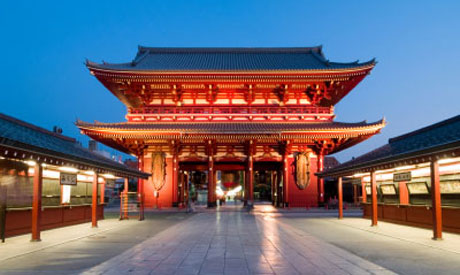
Culture Contrast
Michele talks about the cultural differences. of living in Japan and Canada.
Michele: Well, in total it's been almost four years now.
Joel: Four years. OK. That's about the same for me too.
Michele: Oh, yeah.
Joel: Do you feel like your totally used to it? Are you acculturated?
Michele: I think so. At times there are still some things that are a little bit difficult but for the most part, I don't have a culture shock anymore.
Joel: For example?
Michele: Something that I still struggle with?
Joel: Yes.
Michele: Well, there's still the language barrier because I'm still not fluent in Japanese so, like today I went to the bank and I was trying to do something that was a little out of the ordinary I guess I just had some trouble and I couldn't get it done.
Joel: And you said you had gone back to the United States...
Michele: Canada.
Joel: I'm sorry. You had gone back to Canada and did you have kind of reverse culture shock when you went back?
Michele: Yes, I did actually. I... at that time, I had lived in Japan for about three years and I returned to Canada and I was so used to living in Japan and I guess I had to change my thinking and behaviors a little bit while I was in Japan so when I went back to Canada I felt like, "OK, now I have to change back."
Joel: The first thing I noticed when I had gone back to the United States was in the grocery store, the supermarket, when I was buying my food the cashier would talk to me and ask me questions.
Michele: Right.
Joel: And when I lived in Asia, the cashiers, they never talk to you, and it just threw me off. It threw me off guard. I was very surprised at how much just people you don't know will approach you and talk to you and ask you questions.
Michele: Right.
Joel: And also, you're planning to move back soon again?
Michele: Well, I'm going to go back Canada in the summer for my holidays but then I'll be back in Japan.
Joel: Oh, I see. What do you think you'll miss most while you're gone?
Michele: What will I miss about Japan?
Joel: Yeah.
Michele: I think I'll miss the food the most. I really love Japanese food.
Joel: That's exactly the same for me.
Michele: Yeah.
Joel: I'll miss my yakisoba.
Michele: And good sushi. Udon. I love udon.
totally used to it

Do you feel like you're totally used to it?
When we are 'totally used to' something, that means we are 100% comfortable with it. Notice the following:
- I'm totally used to the hot weather.
- She's not totally used to it yet.
for the most part

They're not difficult for the most part.
We use the phrase 'for the most part' to talk about something that is true, but maybe not 100%. Notice the following:
- For the most part, the trip was fun.
- I enjoyed it for the most part.
culture shock

I don't have culture shock anymore.
The term 'culture shock' is used to describe cultural problems we have visiting a new country for the first time. Notice the following:
- She experienced serious culture shock in China.
- Tokyo's really different from my hometown, but I never got culture shock while I was there.
the language barrier

There's still the language barrier.
We use the term 'language barrier' to talk about; problems we have communicating in a different language. Notice the following:
- The language barrier was a problem.
- There was no language barrier in the Philippines.
reverse culture shock

Did you have reverse culture shock?
If we stay abroad for a long time; for example, to study or work, we sometimes experience reverse culture shock. Notice the following:
- After a year in Paris, I had a kind of reverse culture shock when I went home.
- What's reverse culture shock?
Vocabulary Quiz
language barrier • reverse


















